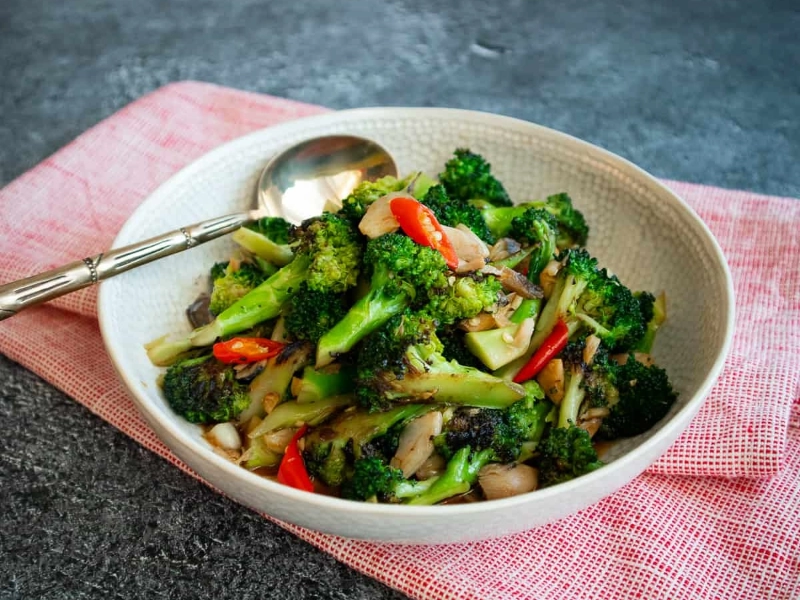Often hailed as a superfood, broccoli is notable for its great fibre count. Along with supporting digestive health, this nutrient-dense vegetable adds to general well-being. Maintaining a good gut, avoiding constipation, and encouraging regularity all depend on fibre in great part. Including broccoli in your diet can help you to maximise its fiber-rich advantages and thus boost your quality of life and digestive capacity. The several uses of broccoli as a natural source of fibre and its favourable effects on digestive health are investigated in this page.

A good diet depends on fibre, which also is rather important for digestive health. Soluble and insoluble fibre are two categories into which it falls. While insoluble fibre increases stool weight and encourages frequent bowel movements, soluble fibre dissolves in water and helps control blood sugar levels and cholesterol. Maintaining a normal digestive system depends on both kinds of fibres. Excellent in both soluble and insoluble fibre, broccoli is a great friend for digestive health. By increasing stool size and ease of passage, the insoluble fibre in broccoli helps reduce constipation. Additionally helping to prevent digestive problems including haemorrhoids and diverticulitis is this kind of fibre. Including broccoli in your meals can help you guarantee you are getting the required fibre to maintain a good digestive tract.

The capacity of fibre to encourage consistent bowel motions is among its most important advantages. Generally speaking, digestive health depends on regularity, which also helps avoid certain gastrointestinal problems. The great fibre content of broccoli helps this process by boosting stool volume and smoothing the intestinal passage. Foods high in fibre, such as broccoli, increase the likelihood of regular bowel motions. For those who could suffer with constipation or irregularity especially, this is quite crucial. Broccoli's fibre absorbs water, softening the faeces and simplifying passing of it. Including broccoli in your diet will enable you to keep a good digestive rhythm and lower your chances of digestive trouble.

Apart from its fibre level, broccoli also has prebiotics, non-digestible dietary elements meant to boost the formation of good gut flora. Overall digestive health depends on a healthy gut flora, which can affect everything including immune system performance and nutrition absorption. Prebiotics stimulate the growth and function of these helpful bacteria by feeding them. As a prebiotic, broccoli's fibre fuels the good gut flora so they may flourish. Broccoli can help lower gastrointestinal risk and improve digestion by encouraging a balanced gut flora. Including broccoli in your meals will improve gut health, so improving digestion and general wellbeing.

Not only is broccoli high in fibre, but is also loaded in antioxidants, which are quite important in lowering body inflammation. Along with aggravating many gastrointestinal problems, chronic inflammation can compromise digestive function. Broccoli's antioxidants— sulforaphane and vitamin C among others—help fight oxidative stress and inflammation. Reducing inflammation helps broccoli maintain a better digestive tract and lessen symptoms connected with diseases such inflammatory bowel disease (IBD) and irritable bowel syndrome (IBS). For people trying to boost their digestive health and general wellness, broccoli is a great meal choice because of its combination of antioxidants and fibre.
Finding creative ways to include broccoli into your meals will help you to enjoy its natural fibre content. Given its several cooking techniques, broccoli is a flexible addition to your diet. For a nutritious boost, steam, roast, stir-fry, or even combine it into smoothies. While adding a great taste, adding broccoli to soups, salads, and casseroles will increase the fibre count of your meals. Raw broccoli with hummus or a yoghurt dip is a fast snack. There are countless opportunities; experimenting with various dishes will help you enjoy eating broccoli.
Serving sizes and daily fibre intake should be considered carefully if one is to promote digestive health successfully. Depending on age and gender, the advised daily fibre intake for adults is 25 to 30 grammes. Given its about five grammes of fibre, a single cup of cooked broccoli is a great supplement to any daily diet. Including broccoli among other foods high in fibre, including whole grains, fruits, and legumes will help you readily reach your daily fibre requirements. Recall that gradually increasing fibre consumption will help your digestive system to adapt. Increasing fibre intake also depends on keeping hydrated since water enables fibre to perform as it should. All things considered, broccoli is a naturally occurring source of fibre that greatly helps to maintain intestinal integrity. Its great fibre count improves gut health, promotes regular bowel motions, and lessens inflammation. Broccoli supports your digestive system and offers several health advantages if you include it into your diet in different appealing ways.